What is Chronic Kidney Disease?
Chronic kidney disease is a condition where your kidneys are not functioning as they should. This means that your kidneys are injured, damaged or ageing1.
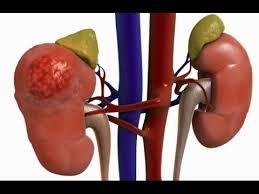

Every human being has two kidneys located on the top part of the abdomen, at the back of the intestine and on each side of the spine. The chief functions of the kidney are3:
- Filters unwanted materials from the blood
- Regulates blood pressure by making the hormones responsible for blood pressure and controlling water removed through the urine
- Manufactures a hormone known as erythropoietin which arouses the bone marrow to produce red blood cells
- Maintains the normal level of chemicals and salt in your blood
When you have a chronic kidney disease, your body is unable to carry out the above functions properly. Chronic kidney disease varies in severity according to the stage of the disease you have. At stage 3, chronic kidney disease is moderately severe while at stage 4, it is severe. Stages 1 and 2 are not so serious, although in stage 1 your kidney functions normally. In stage 5, the condition is very severe and it leads to kidney failure.
Chronic kidney disease stage 3 is the first stage identified by a blood test. It accounts for many people detected for chronic kidney disease. Medical studies have shown that in every 10,000 adult patients, about 144 patients will be detected yearly with chronic kidney disease stage 3. Chronic kidney disease stage 3 may also be detected in patients where the illness was not identified in the previous clinical tests.
Causes of Chronic Kidney disease
There are various causes that are responsible for chronic kidney disease. The main causes are high blood pressure and diabetes4, 5.
Diabetes
Type 2 and type 1 diabetes cause diabetic nephropathy. This is a condition where diabetes damages your kidney. Your kidney has numerous blood vessels which remove waste from the blood. In case of diabetes, high blood sugar destroys these blood vessels. This can cause your kidney not to function properly after sometimes and eventually it may stop working.
High blood pressure
High blood pressure or hypertension can damage your kidneys if not controlled properly. High blood pressure is brought about by high cholesterol in the blood as well as obesity.
Other causes include:
Glomerulonephritis
This is a condition that causes damage and inflammation in your kidney filtration system. This can cause failure of your kidneys. Glomerulonephritis can occur as a result of autoimmune disorders which wrongly attacks and damages your kidneys. Another cause is infections that occur after surgery to your kidneys.
Polycystic kidney disease
This is a hereditary condition that causes cysts to develop in your kidney. Both of your kidneys may have many cysts. These cysts can eventually damage your kidney.
Medications
Use of certain drugs can cause damage to your kidneys. For example, when you use analgesics drugs like ibuprofen and Tylenol for a long period of time, they can damage your kidneys.
Ischemic nephropathy
This illness occurs as a result of atherosclerosis, a condition where your arteries walls become hardened due to fat deposits. The hardening of the arteries can damage your kidneys.
Cancers
Cancers that develop in your kidneys can also damage it. These cancers block urine from passing through the urinary system which overwhelms the kidney thus damaging it. An enlarged prostate can also damage your kidney.
Kidney stones
Presence of stones in your kidneys affects its function. These stone may also attract microorganisms such as bacteria, fungi and parasites that cause infections in your kidneys.
Risk factors for Chronic Kidney disease
A number of factors can elevate your risk for chronic kidney disease such as2
- Type 2 and type 1 diabetes
- Hypertension pressure and high cholesterol
- Heart and liver disease
- Urinary tract infections and other problems
- Autoimmune diseases such as lupus
Symptoms
Kidney disease may continue for a long time without any symptoms. Chronic kidney disease stage 3 may exhibit the following signs and symptoms6
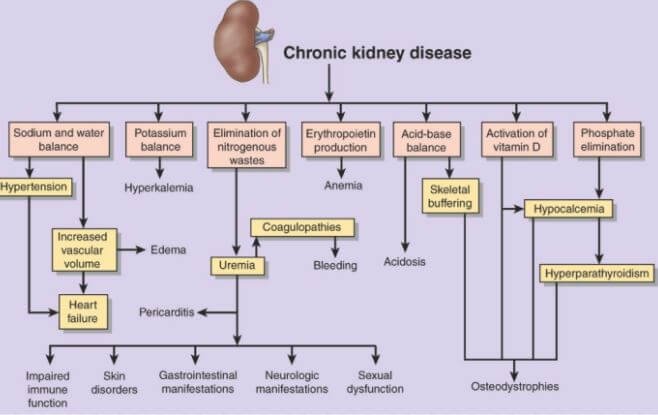
The patient has increased urge to urinate frequently at night. Legs may swell as well as puffiness around your eyes (a condition where fluids are retained around your eyes). Loss of appetite, nausea and vomiting are other symptoms reported by patients. Other symptoms include shortness of breath, itching of the skin, high blood pressure and fatigue.
Stages
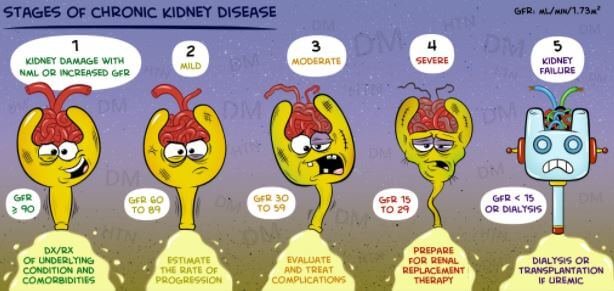
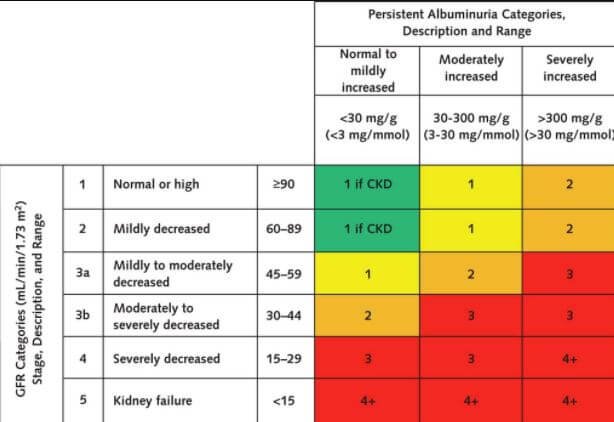
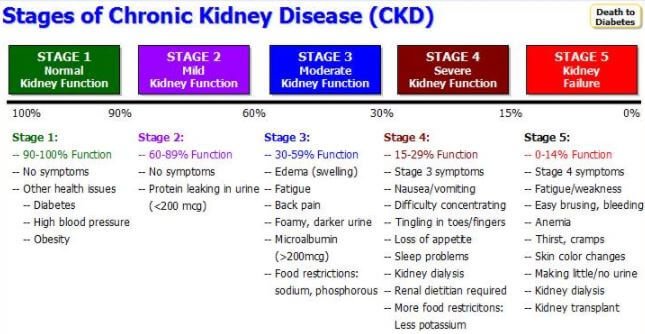
Diagnosis
Chronic kidney disease does not manifest any signs and symptoms in the early stages. Therefore only laboratory tests can confirm the diagnosis of chronic kidney disease. The following tests can be ordered to confirm the diagnosis of chronic kidney disease3, 4:
Urine tests
Analysis of your urine will provide more details about the function of your kidney. Your doctor can collect your urine or order you to provide urine sample according to instructions. Once your urine is collected, your doctor performs tests to check for proteins, red blood cells and white blood cells and presence of cysts. Your doctor may also determine glomerular filtration rate to find out the overall function of your kidney.
Blood test
Your doctor can also order blood tests to confirm diagnosis of chronic kidney disease. In this test, analysis focuses on checking for creatinine and urea in the urine. Creatinine is a product that results from muscle breakdown. High presence of these products in the urine indicates damage to your kidney. Electrolyte levels such as potassium and calcium are also checked. An imbalance in electrolyte levels indicates kidney dysfunction.
Other tests include
- Imaging tests: Ultrasound is used to check for problems in your kidney.
- Biopsy: A sample of your kidney tissue is extracted and analyzed to determine the cause of chronic kidney disease.
Treatment
Managing chronic kidney disease involves use of medications and lifestyle changes. The main aim of treatment is to slow down the kidney disease from advancing, treat the cause and complications properly and replace the severely damaged kidney1, 2.
Medications: Your doctor can prescribe antibiotics to treat bacterial infection.
Surgery: Surgery can be ordered to remove the kidney if it is severely damaged.
Lifestyle changes
Although chronic kidney disease cannot be prevented, you can take several measures to slow it down. You can try the following measures
- Talk to the dietician to help you determine the right amount of protein to eat.
- Take little salt
- Limit intake of potassium and phosphorous
- Quit smoking
- Reduce your weight
- Reduce high sugar intake
- Discontinue certain drugs such as aspirin, ibuprofen after consulting your doctor.
- Exercise regularly
Complications
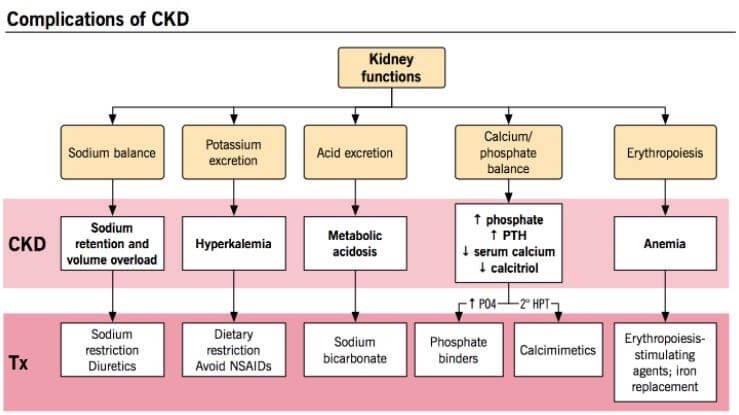
Reference List
- Chronic kidney disease. https://patient.info/health/chronic-kidney-disease-leaflet
- https://www.davita.com/kidney-disease/overview/stages-of-kidney-disease/stage-3-of-chronic-kidney-disease/e/4749
- https://renal.org/information-resources/the-uk-eckd-guide/stage-3-ckd/
- http://www.nationalkidneycenter.org/chronic-kidney-disease/stages/stages-3-to-4/
- https://www.belmarrahealth.com/stage-3-chronic-kidney-disease-symptoms-diet-treatment/
- https://www.emedicinehealth.com/chronic_kidney_disease/article_em.htm
